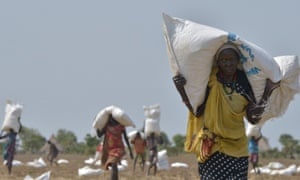Date: Thu, 14 May 2015 15:54:10 +0200
Umbrella group of aid organisations voices fears over potential humanitarian repercussions of bill that would impose 20% limit on foreign staff
A new law that would force aid agencies working in South Sudan to ensure that no more than a fifth of their staff are foreigners could cost lives and have “catastrophic effects” on those most at risk in the aid-dependent and conflict-riven nation, a group of NGOs has warned.
On Wednesday, South Sudan’s parliament passed the non-governmental organisations (NGO) bill, which, according to the office of the president, Salva Kiir, is intended “to regulate the NGOs, international and local”.
Although the bill is still awaiting Kiir’s signature, the South Sudan NGO Forum fears it could jeopardise humanitarian operations once enacted.
South Sudan, the world’s youngest nation, has been convulsed by civil war since December 2013, when Kiir accused his former vice-president, Riek Machar, of plotting a coup.
The resulting conflict – which has split the country along ethnic lines, pitting Kiir’s Dinka against Machar’s Nuer – has killed more than 10,000 people, forced about 1.5 million from their homes, and left 2.5 million facing severe food insecurity.
The South Sudan NGO Forum, which represents 160 national and 140 international NGOs working in the country, said that while it welcomed the prospect of a strong regulatory framework to make it easier for its members to operate “within a coherent and consistent legal environment”, it was worried about the bill’s humanitarian impacts.
“There are still significant concerns that certain provisions of the NGO bill will not regulate NGO operations, but rather hinder their ability to serve South Sudanese people at a time when needs are escalating due to the ongoing conflict,” the forum said in a statement.
“It’s also important to note that NGOs are not currently operating unregulated. NGOs operate under national laws as well as rules and regulations of individual government bodies.”
Given that South Sudan has a shortage of skilled workers, and a literacy rate of only 27%, there are fears that basic humanitarian operations could be severely undermined by the legislation.
“If the bill is implemented in a way that creates a more regressive environment, then this will have potentially catastrophic effects for the large amounts of the South Sudanese population that rely on NGOs to provide basic services and life saving aid,” said the forum.
“NGOs are already under mounting administrative pressure and often subject to arbitrary enforcement of rules and regulations. There are increasing incidents of harassment and violence against NGOs.”
With the conflict intensifying, said the forum, food was becoming scarcer and NGOs were finding themselves trying to help people in increasingly difficult circumstances.
The statement added: “If the bill makes getting assistance to people harder rather than easier, it could cost lives at a time of tremendous suffering for South Sudanese communities.”
Last September, the government ordered all foreign workers, including aid agency staff, to be replaced by South Sudanese citizens, only to reverse the policy announcement a day later.
In the latest flare-up of fighting, government forces are pushing towards Machar’s hometown of Leer, in Unity state, which is held by his supporters. The area, which the troops have surrounded, is home to some of the country’s once lucrative oil fields. It was the scene of heavy fighting in January last year, during which the town was virtually destroyed and a Médecins Sans Frontières hospital was attacked, looted and torched.
Fears of an attack on Leer led the UN and all the NGOs working in the area to withdraw their staff last week.
Toby Lanzer, the UN’s humanitarian coordinator in South Sudan, said on Wednesday that the evacuation of aid workers in southern parts of the state had left more than 500,000 people without life-saving aid.
His warning came a day after the UN said at least 28 towns and villages in Unity had been attacked and burned since the end of April, adding there had been reports of killings, rape, abduction and looting of cattle and other property.
Months of peace talks in neighbouring Ethiopia have so far failed to reach any lasting agreement, or even negotiate an enduring ceasefire. On Tuesday, the head of the African Union commission, Nkosazana Dlamini-Zuma, said South Sudan was facing a “catastrophic humanitarian situation” with the “loss of countless human lives and untold suffering”.
